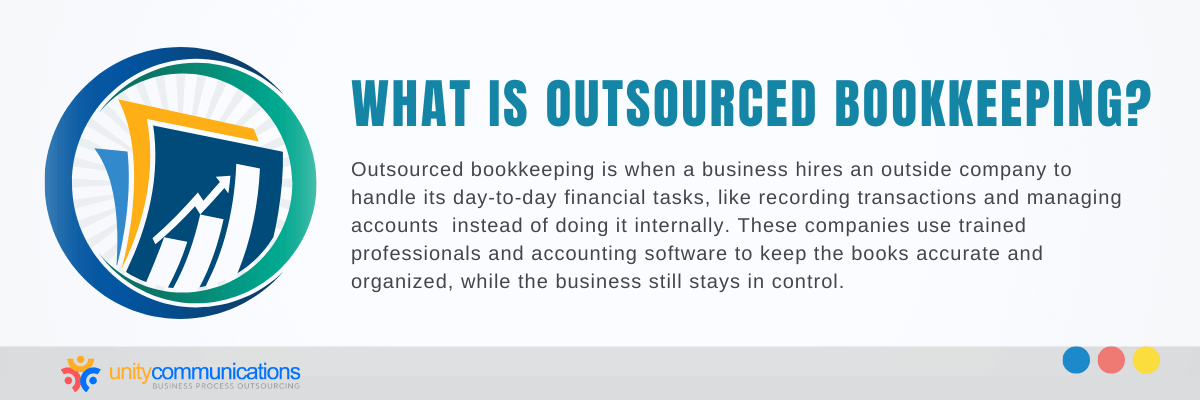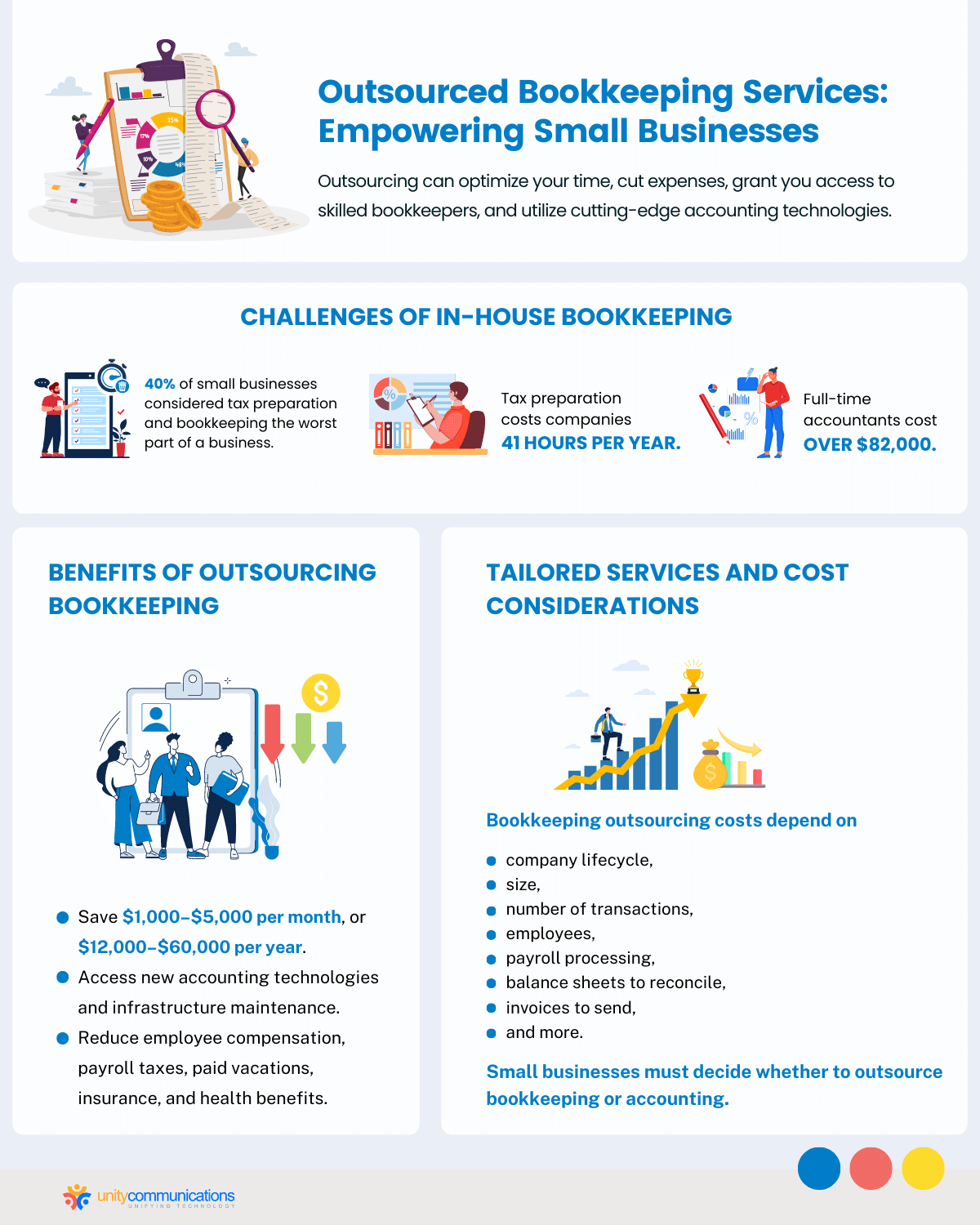IN THIS ARTICLE
Table of Contents
Managing small business finances can drain your time, energy, and focus, especially when bookkeeping tasks pile up. Outsourced bookkeeping helps you stay financially organized without handling every detail yourself.
If you want to outsource bookkeeping for small businesses, this guide breaks down everything you need to know. Keep reading to discover when it works and doesn’t and how to get started with external experts.
What is outsourced bookkeeping?

According to Business Research Insights, the global bookkeeping services market hit $46.1 billion in 2024 and could reach $106.94 billion by 2033. This growth shows how quickly businesses outsource the work for better accuracy and less overhead.
Outsourced bookkeeping means delegating daily financial tracking to a business process outsourcing (BPO) company instead of handling it in-house. BPO providers have specialists who use accounting software to record transactions, reconcile bank accounts, and manage ledgers. You remain in control while these experts keep your books organized and up-to-date.
External providers assist in the following tasks:
- Categorizing daily income and expense transactions
- Generating and sending invoices
- Managing billing cycles
- Reconciling bank, credit card, and loan accounts
- Producing clear monthly financial statements
- Tracking accounts payable and receivable activity
- Forecasting cash flow and building budget reports
- Recording payroll entries and deductions
- Reviewing expenses to identify tax-deductible items
- Organizing records for audit or investor readiness
- Preparing books for year-end close and tax filings
- Structuring and maintaining your chart of accounts
- Syncing data across accounting, payroll, and point-of-sale (POS) tools
- Spotting unusual transactions or inconsistencies
- Analyzing trends in cash flow and spending behavior
- Securing financial records with cloud-based backups
Understanding how outsourcing works can help you make smarter decisions. You share your files or system access, and the service provider updates your books weekly or monthly. Some firms offer real-time updates using cloud-based platforms.
If you want to outsource bookkeeping for small businesses, this approach gives you access to skilled professionals without full-time staffing costs. However, knowing what BPO firms offer is necessary to see if it suits your needs.
Why and when to outsource bookkeeping for small businesses

According to Glassdoor, hiring an in-house U.S. bookkeeper can cost over $45,000 annually. That figure is equivalent to £25,499 (≈$34,400) in the UK and AUD65,000 (≈$43,000) in Australia. If you’re watching your budget, these amounts can be steep.
Outsourcing bookkeeping allows small businesses to access professional help at a lower cost. Depending on your needs, many BPO providers offer monthly rates between $500 and $2,000. That’s $34,000 to $52,000 annually, less than half the cost of hiring full-time in the U.S.
The advantages of outsourced bookkeeping stand out when your business is growing fast or your workload keeps piling up. You no longer have to juggle spreadsheets or stress about payroll deadlines. Third-party contractors help you run smoothly by offering skilled, efficient service.
You gain practical benefits such as:
- Reduced overhead from not hiring full-time staff
- Faster access to financial reports and reconciliations
- Fewer errors from manual data entry
- More time to focus on sales or client work
- Flexible service levels based on your monthly needs
The benefits are even more apparent for newer businesses. Many firms now offer outsourced bookkeeping for startups, helping founders and entrepreneurs organize finances early without overcommitting resources. You only pay for what you use, helping you stay lean while growing.
Other situations that can benefit from outsourcing include:
- Your transactions have grown more complex.
- You manage multiple bank or merchant accounts.
- You need help categorizing or tracking recurring expenses.
- You’re preparing to meet with lenders or investors.
- Your team lacks internal accounting experience.
- You’re unsure how to interpret key financial metrics or trends.
If you’re overloaded with financial tasks, outsourcing your bookkeeping might be the support your business has been missing.
When you shouldn’t outsource

Some business owners prefer to outsource bookkeeping for small businesses, but it’s not always the right decision. A small startup with a few 30-day transactions might need only 5 to 10 hours of monthly bookkeeping. Hiring an external provider could cost more than doing it yourself.
You might want to keep your books in-house if you prefer direct control or already have simple systems. Managing your numbers gives you hands-on insight and complete visibility. For some owners, in-house tracking feels more efficient.
General bookkeeping outsourcing can fall short in highly regulated industries, such as legal, nonprofit, and healthcare. Traditional BPO firms might not understand specialized compliance needs. Instead, you might require a niche provider with domain-specific expertise, robust internal controls, and a clear understanding of industry regulations.
Here are other signs outsourcing might not be worth it:
- Your software is already customized for internal use.
- Real-time updates are critical, and delays cause problems.
- You’re dealing with sensitive, complex data regularly.
- You work from a location with unreliable internet or cloud access.
- Your team already includes someone with strong financial skills.
- You rely on face-to-face collaboration for financial decisions.
- You need immediate access to physical financial documents.
If you also plan to outsource data entry services, assess whether your volume justifies it. Sometimes, your team can handle basic tasks more quickly, especially when updates happen daily. Data entry, while repetitive, typically requires close familiarity with your business processes.
Knowing when not to outsource bookkeeping for small businesses protects your budget and workflow. Keep tasks in-house when they’re still manageable or when external help adds friction instead of relief.
Quick checklist: Is outsourcing right for you?

If you’re unsure whether to outsource bookkeeping, a quick self-check can help you decide. The right questions can reveal whether outsourcing adds value or clutters your workflow with unnecessary steps.
Answering yes to most of the questions below might mean you’re ready to explore outsourced bookkeeping:
- Do you spend more than five hours a week on bookkeeping tasks?
- Are you behind on monthly reconciliations or reports?
- Is accuracy a concern in your current financial records?
- Do you struggle to keep up with tax deadlines?
- Would you rather spend more time on customers than spreadsheets?
- Do you avoid reviewing your books because the process feels overwhelming?
If you want more help deciding, follow an outsourced bookkeeping guide that explains options based on your industry, size, budget, compliance needs, and goals. It can give you clarity without committing right away. Many service providers also let you adjust based on activity level, seasonal demand, and monthly workload.
Knowing when to outsource bookkeeping helps you stay focused and less overwhelmed. If basic tasks are slowing you down, outsourcing to a reliable BPO organization can be the lift your operations need.
How to get started if you decide to outsource
If you’ve decided to outsource bookkeeping for small businesses, the first step is identifying the tasks to delegate. Outline your must-haves, such as invoice tracking, payroll, reconciliations, or monthly reports. Then, list BPO providers specializing in small enterprises and startups that can match your pace, budget, and industry.
Once you have options, interview each service provider. Ask about their workflow, communication style, and typical response time. Clarify how they handle accuracy, what tools they use, and what access they need. You want to partner with a BPO vendor that fits your values and understands your bookkeeping goals.
Start by reviewing back-office outsourcing policies around data security and confidentiality. Ask how they plan to store your financial information, who can access it, and whether they follow local compliance laws. A credible service provider can discuss these points before moving forward.
Use this checklist when speaking with vendors offering financial support. These back-office outsourcing services tips can keep you on the right track:
- Confirm their experience with your accounting software.
- Request sample reports or dashboards.
- Ask how they handle handovers from in-house teams.
- Check if they can assign a contact person.
- Clarify the billing structure and frequency.
- Review their client references or ask for recent testimonials.
- Determine whether they can handle urgent requests or last-minute updates.
- Inquire about their onboarding process and timeline.
- Check their familiarity with your country’s tax rules.
Some BPO firms use the latest accounting technologies to give you real-time dashboards and intelligent alerts. These features help you track business health without digging through spreadsheets.
Outsourcing your bookkeeping is about saving time and finding a partner to help you run leaner and smarter financial operations.
The bottom line

Are you looking to simplify your finances and free up time to grow your small enterprise by outsourcing bookkeeping? Working with skilled, cost-effective professionals can help you stay on top of reports and focus more on your customers.
If you’re tired of juggling spreadsheets, now is the right time to take that step. Let’s connect and explore how we can support your bookkeeping goals.





